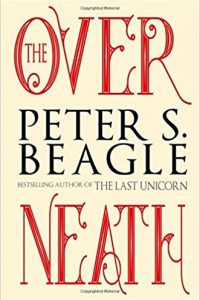Gary K. Wolfe Reviews H’ard Starts: The Early Waldrop by Howard Waldrop
 H’ard Starts: The Early Waldrop, Howard Waldrop (Subterranean 978-1-64524-117-1, $50.00, 370pp, hc) June 2023. Cover by Doug Potter.
H’ard Starts: The Early Waldrop, Howard Waldrop (Subterranean 978-1-64524-117-1, $50.00, 370pp, hc) June 2023. Cover by Doug Potter.
I suppose there’s a nugget of irony in the fact that Howard Waldrop’s first professional sale, a story called “Lunchbox”, was also one of the very last stories that John W. Campbell, Jr. accepted for Analog. As Waldrop remembers it, Campbell accepted the story in October of 1970 and dropped dead a few months later. (The story didn’t appear until 1972, after Ben Bova had taken over as editor.) The irony is that Waldrop, in his own idiosyncratic way, would go on to represent a new generation of writers whose fiction helped undermine the old Astounding/Analog paradigm of rational progress and unapologetic colonialism. His view of history was more one of chaos than of progress, drawing inspiration from sources as eclectic as bad 1950s SF movies, UFO cults, Proust, rock ’n’ roll, Thomas Wolfe, Louis Armstrong, and even Dwight Eisenhower, who, having given up on West Point, showed up as a top jazz clarinetist in the 1982 story “Ike at the Mike”.
That story, however, is not included in H’ard Starts: The Early Waldrop, nor are any of the other classic tales that earned Waldrop a World Fantasy Life Achievement Award a couple of years ago, a rarity for an author mostly known for short fiction. But that anecdote about Campbell is here, as part of an extended interview with Bradley Denton, and so are a handful of con reports (mostly detailing Texas fandom in the early 1970s), some fanzine stories, a couple of Crawdaddy articles, a few very short one-act plays (including a comedy sketch submitted unsuccessfully to the Red Skelton TV show), and Waldrop’s earliest professional sales, including that story “Lunchbox”, a short comic piece about the first Viking Mars lander. For the most part, the collection focuses on the decade 1964-1974, beginning with a couple of fanzine stories from when Waldrop was still in high school (and which show a distinct influence of Robert E. Howard) and including tales that eventually appeared in Terry Carr’s Universe anthologies and other prestigious venues.
In other words, H’ard Starts is not the place to start for readers unfamiliar with Waldrop, and Bradley Denton’s comments in the interview portions suggest that even some of the strongest stories here, like the time-shifting Hiroshima fable “Mono No Aware”, only begin to approximate what later readers would come to think of as “Waldroppian.” The other most substantial stories, unexpectedly, are deep-space romances admittedly written under the influence of Cordwainer Smith. The longest story in the book, “Billy Big-Eyes”, features a protagonist altered to see the entire electromagnet spectrum – except for what we see as visible light. But like one of Smith’s Scanners, he’s a heroic explorer (“The Scouts flew great crystal ships between the stars, leaving jets of radiation half a light-year long”) who risks everything to try to rescue his lover, whose ship has gone missing. “My Sweet Lady Jo” seems a direct response to “The Lady Who Sailed The Soul”, although its final twist is a bit predictable by today’s standards.
But if the fiction offers only hints of the masterful career to come, the book as a whole builds a compelling portrait of the artist as a young fan with a keen desire to become a player and an already waggish sense of humor (one of the pieces, which previously appeared in a con program book, reimagines classic movies as though they were part of the Cthulhu mythos, mostly by randomly inserting apostrophes into character names). There isn’t a lot of fannish namedropping, although Waldrop’s account of finally meeting George R.R. Martin after they had been pen pals since high school is both funny and touching. Most of the other figures from the Texas fandom of a half-century ago never gained broader fame, and those who did, like the very talented Tom Reamy, are unfortunately not widely read these days (although Subterranean recently announced an edition of his collected stories). Harlan Ellison also plays a role in a few funny anecdotes, but then he always does. Waldrop’s vivid accounts of everything from running an overworked registration desk to late-night parties will no doubt resonate with anyone who has worked a con, however, and in the end H’ard Starts serves as a generous resource loaded with insights into one of the field’s most distinctive and enduring voices.
Gary K. Wolfe is Emeritus Professor of Humanities at Roosevelt University and a reviewer for Locus magazine since 1991. His reviews have been collected in Soundings (BSFA Award 2006; Hugo nominee), Bearings (Hugo nominee 2011), and Sightings (2011), and his Evaporating Genres: Essays on Fantastic Literature (Wesleyan) received the Locus Award in 2012. Earlier books include The Known and the Unknown: The Iconography of Science Fiction (Eaton Award, 1981), Harlan Ellison: The Edge of Forever (with Ellen Weil, 2002), and David Lindsay (1982). For the Library of America, he edited American Science Fiction: Nine Classic Novels of the 1950s in 2012, with a similar set for the 1960s forthcoming. He has received the Pilgrim Award from the Science Fiction Research Association, the Distinguished Scholarship Award from the International Association for the Fantastic in the Arts, and a Special World Fantasy Award for criticism. His 24-lecture series How Great Science Fiction Works appeared from The Great Courses in 2016. He has received six Hugo nominations, two for his reviews collections and four for The Coode Street Podcast, which he has co-hosted with Jonathan Strahan for more than 300 episodes. He lives in Chicago.
This review and more like it in the June 2023 issue of Locus.
 While you are here, please take a moment to support Locus with a one-time or recurring donation. We rely on reader donations to keep the magazine and site going, and would like to keep the site paywall free, but WE NEED YOUR FINANCIAL SUPPORT to continue quality coverage of the science fiction and fantasy field.
While you are here, please take a moment to support Locus with a one-time or recurring donation. We rely on reader donations to keep the magazine and site going, and would like to keep the site paywall free, but WE NEED YOUR FINANCIAL SUPPORT to continue quality coverage of the science fiction and fantasy field.
©Locus Magazine. Copyrighted material may not be republished without permission of LSFF.




